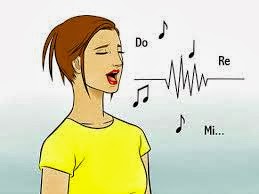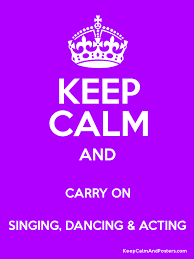In the Singing Practice Room and Lessons: 3 Main Principles of singing we should think about.
Now that you have identified a good place to practice and practice disciplines, let's tap into our brains!! By setting our space we have gotten the brain ready to think about singing. Here is where a few yoga or short meditation may help as well to set the brain and body in the right space.
The actions one performs while singing begin in the brain. The brain sends certain instructions to the nerves and muscles used to produce singing and often needs extra time to learn new messages and retrain the old thoughts. You must be intentional is asking the brain to send new instructions with regular practice. 'Old habits die hard' and thinking differently is a true key to getting the muscles to respond differently and improve or change singing.
There are 3 main principles we should all think about in the practice room AND lessons
1. Breath management
2. Getting rid of tensions
3. Vowel formation
Breath management: One of the best ways to tap into managing your breath for singing is through yoga, meditation, pilates. A short practice leading into singing practice is great to tap into the low relaxed breathing we need to sing. Learning to take a full breath in a relaxed way, learning which muscle groups to engage when expelling the breath, and doing so reliable takes time and practice. So too does learning tto release the tension in the muscles at the end of an exhale in order to prepare for a full inhale involves much muscle coordination. We can work on managing our breath with these extra body practices as well as breath exercises specifically for singing. Self monitoring and teacher monitoring are crucial.
-Outside disciplines: Yoga, Pilates, Meditation
-Singing exercises: Full inhale and exhale on a hiss like a leaky tire for certain number of counts
Lip buzzes or motorboats both general and on particular pitches
Sustaining sung phrases while monitoring breath management
Eliminating Tension: We identify tension in our bodies as we work on breath management and work towards releasing that tension as we produce singing. We often first feel where the throat is tight, but not be are that the tightness begins in another area such as the back of t eh neck, the jaw, the tongue. Taking time to identify the tension is the first step in relieving the tension.
For example: Identify: Is your tongue tight? Ribs collapsing or tight?
Then: Do you have enough breath for the phrase?
Do you have enough space in your jaw or is your jaw tense and cutting down on the fluidity of breath?
*What are the areas of tension and can you release that tension to get better breath management.
Vowel Formation: Warm up exercises should begin with a series of pure vowels in a comfortable middle range. We most often use Italian vowels of (/a/ //e/ /i/ /o/ /u/) in mid-range voice on warmup exercises, we work towards extending the range. This helps our sound be carried by the breath in a flowing manner. We then add consonants to eventually form words. Time spent on vowels only is very beneficial to identifying breath management and eliminating tension before we introduce true words. Consonants do aid in this process both in nonsense words and true words that are not a part of a song.
These concepts are all interconnected but can be focused on individually in warmups or vocalise before moving on to repertoire. As you work on your repertoire, reiterate the concepts both individually and combined. Write down what you notice changes between warmups into repertoire and apply the next day. Remember one thing at a time and due diligence with regular practice pays off. Your brain and your body will thank you!






